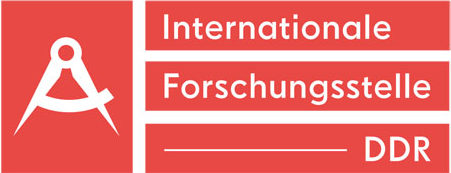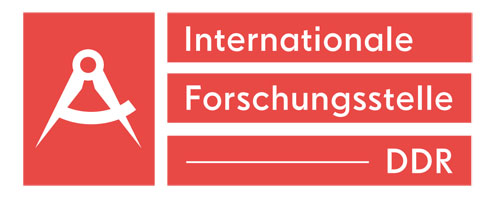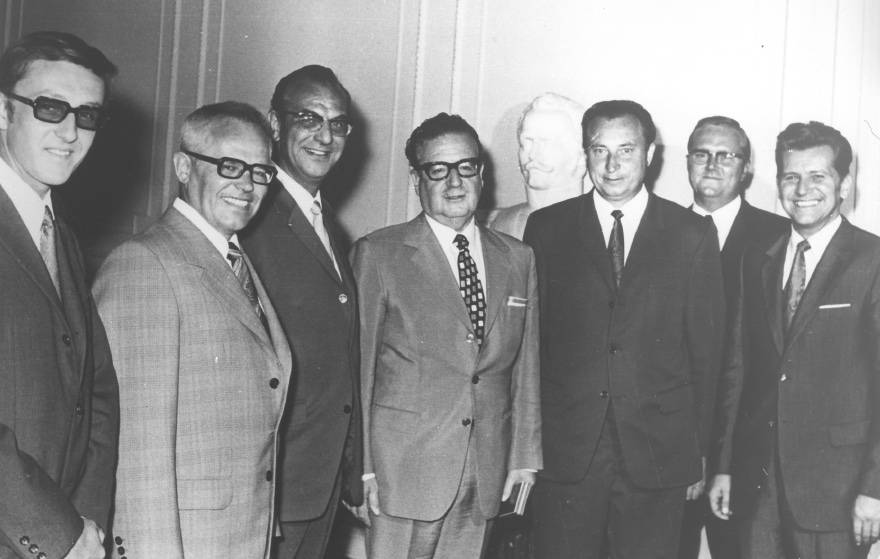
Introduction
Although fifty years have passed since the coup d’état in Chile, the event continues to make headlines today. It was only at the end of August 2023 that seven military officers were convicted of the torture and murder of Víctor Jara. Chile’s current president and justice minister also recently announced a “National Plan for the Search for Truth and Justice” to investigate the still unresolved whereabouts of tens of thousands who disappeared during the coup. Right-wing forces in Chile aggressively maintain their outspoken support for the coup to this day. Events and demonstrations commemorating the anniversary in Chile were met with repression, even under President Gabriel Borić.
The 50th anniversary has been widely discussed in the German public sphere as well. Today, there is largely consensus in the rejection of Augusto Pinochet’s military coup. Yet this was not always the case in the Federal Republic of Germany (FRG, commonly referred to as “West Germany”). The German Democratic Republic (GDR, “East Germany”), on the other hand, mobilized a remarkable solidarity campaign at the time, which was supported and sustained by broad sections of the population. The election victory of the Unidad Popular in 1970 had been enthusiastically celebrated in West German leftist movements too, and its brutal suppression triggered a wave of solidarity across West Germany. At the time, however, politicians from the conservative Christian Democratic Union of Germany (CDU/CSU) and business leaders made no secret of their support for the military’s violent takeover, including the torture and murder of thousands of Chileans. To this day, the role of the FRG’s intelligence service, the Bundesnachrichtendienst (BND), has not been fully clarified. There is mounting evidence that the BND supported the military junta’s violent repression of the Chilean population.1See, among others: Bergmann; Fugmann: “Did the German Secret Service BND Support Pinochet’s Coup?” at: https://www.mdr.de/nachrichten/deutschland/chile-putsch-bnd-colonia-dignidad-waffen-100.html Or also: FAKT: “German Secret Service Agents and Diplomats in Chile” at: https://www.ardmediathek.de/video/fakt/deutsche-geheimdienstler-und-diplomaten-in-chile-73/das-erste/Y3JpZDovL21kci5kZS9zZW5kdW5nLzI4MTA2MC8yMDIzMDkwNTIxNDUvZmFrdC1ibmQtZ2VnZW4tc3Rhc2ktMTAy
Germany has an intense history of neo-colonial influence in South American countries, especially Chile, which is often overlooked due to the USA’s dominant role on the continent. The following article traces out aspects of Germany’s long economic relationship with Chile to draw out the character of relations that the two German states maintained with Chile during Salvador Allende’s presidency (1970–1973). In direct contrast to the GDR, West Germany’s imperialist policy in Chile, which continues to this day, becomes all the more apparent.
Yet the events in Chile 50 years ago are topical above all because the political program of the Unidad Popular (UP), which sought to combat imperialist influence and the nation’s plunder by leading capitalist corporations. The UP’s advocacy of sovereign development for the peoples of Latin America and beyond remains as relevant as ever. In an intense phase of the international class struggle, the UP government had radically and offensively posed the question of “who owns what” in industry and agriculture, thus inspiring progressive and anti-imperialist forces throughout the continent and worldwide. The UP’s declaration to break out of neo-colonial subjugation was answered by the imperialist forces unequivocally and with extreme violence.
The experiences of the Unidad Popular, the coup 50 years ago, and the role of the FRG and GDR have a direct political connection to current struggles against imperialism. The following text is intended to contribute to a better understanding of this relationship and to enrich current debates along these lines. In many instances, contemporary scientific literature from the DDR was referenced, whereby the foundational work “Grundfragen des antiimperialistischen Kampfes der Völker Asiens, Afrikas und Lateinamerikas in der Gegenwart” (Fundamental Questions of the Anti-Imperialist Struggle of the Peoples of Asia, Africa and Latin America in the Present) from 1974 should be emphasized, which comprehensively investigates the genesis of capitalism and the balance of power in Latin America.
German capital anchors itself in Latin America
Between 1846 and 1914, some 11,000 Germans emigrated to Chile.2See Bernedo, Patricio; Bilot, Pauline: “La inmigración alemana en Chile en el siglo XIX”. In: Dufner; Fermandois; Rinke: “Germany and Chile, 1850 to the present: a handbook”. Akademischer Verlag Stuttgart, 2022, p. 50. Not an enormous number and yet, through associations and German schools, the German migrants built up a network that is still influential today and that was to become the basis for intensive German economic activity in Chile.3As of 2015, there were 27 German schools in Chile, the highest number of foreign schools in relation to the population.
“By 1890, six German companies were exploiting Chilean saltpetre, controlling about 18% of total production. On the other hand, exports of manufactured goods from Germany, mostly related to the saltpetre industry, increased exponentially until just prior to the First World War.“4Sanhueza, Carlos: “Chile y Alemania 1871–1914: un vínculo que se solidifica”. In: Dufner; Fermandois; Rinke (2022), p. 57.
By 1900, Germany had become the main customer for Chilean saltpetre, which was mainly used to produce fertilizer and explosives until a synthetic substitute was introduced during the First World War. With the presence of the industry, German banks also came to Chile to handle the saltpetre business. By 1914, the German Empire had risen to become the largest supplier of industrial goods to Chile, which were needed, among other things, to extract the chemicals.
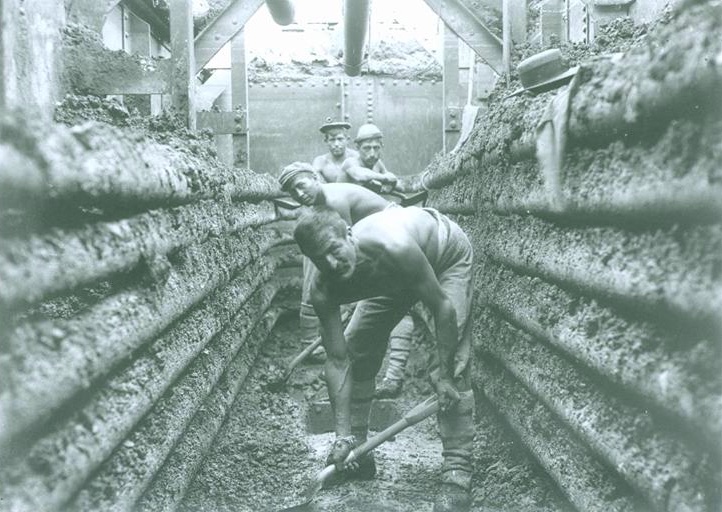
The characteristic division of roles between developed capitalist countries and (former) colonies or “developing countries” that we are still familiar with today is discernible: an economy is oriented towards the export of raw materials and is dependent on the import of industrial goods. Typical of the development of Latin American countries was the alliance of a landowning oligarchy with foreign capital, which led to a specific development of capitalism in which pre-capitalist, feudal property relations were mixed with capitalist production that remained primarily focused on a few agricultural products and natural resource extraction.
While in the 19th century it was primarily English capital that benefited from this trade imbalance, U.S. imperialism gradually came to dominate Latin America. With the Pan-American Union, founded as early as 1889 at the first Pan-American Conference, an increasingly complex system of domination over the continent was developed. The Military Pact of Rio de Janeiro (1947) and the creation of the Organization of American States (1948) continued this trend in a comprehensive way after the Second World War:
“With the development of domestic capitalism, a differentiation of the domestic bourgeoisie took place since the end of the Second World War; a part of this class developed into the industrial upper bourgeoisie. […] The native bourgeoisie got deeper and deeper into the dilemma “either support a radical solution of the country’s problems, which can easily escalate to a revolutionary upheaval, or to capitulate before imperialism and its domestic allies.” […] The native bourgeoisie therefore tended to associate itself more closely with U.S. imperialism, the pro-imperialist upper bourgeoisie and the wealthy landowners, despite the existence of economic and political contradictions with them, and increasingly began to support the suppression of the mass movement on which it had previously relied.“5Authors‘ collective headed by Rathmann, Lothar: “Grundfragen des antiimperialistischen Kampfes der Gegenwart Teil II”. Akademie-Verlag, Berlin, 1974, p. 1184.
Alongside the contradiction between the development of the productive forces and the elements of pre-capitalist relations of production and the contradiction between the peoples of Latin America and the imperialism that exploits them, the struggle between the bourgeoisie and the proletariat, which runs within the countries, increasingly came to the fore in Chile.
In 1929, the first regional consultation of 15 communist parties of the countries of Latin America took place in Buenos Aires. The parties agreed that the coming revolution on the continent would be bourgeois-democratic, agrarian, anti-imperialist in character. The struggle for liberation from imperialist shackles contained an anti-capitalist tendency. In 1934, a regional consultation was held again in Montevideo, where the communist parties set themselves the task of creating broad anti-imperialist fronts, with the popular front government of the Frente Popular in Chile in 1938 representing a culmination of this strategy.6Ibid. p. 1182.
The victory of the Cuban Revolution in 1959 was a serious setback for imperialism in the region. The U.S. government under Kennedy reacted in 1961 with the “Alliance for Progress”, a development program that was intended both to channel the pressure of progressive movements into channels that were harmless to imperialism and to deepen subordination to the dominance of U.S. finance capital. U.S. President Lyndon B. Johnson proclaimed unequivocally in 1965:
“American countries cannot and must not allow another communist government to be constituted in the Western Hemisphere.“7Ibid. 1198.
During the 1960s, and as part of this integrating tactic, certain changes developed in the international division of labour. Labour-intensive branches of the manufacturing industry, especially in the production of food and simple consumer goods were increasingly relocated to Latin American countries as well.
In 1969, a minister of the Federal Republic of Germany (FRG) stated,
“[…] that structural changes must also be made in [Latin America’s] own economic sectors in the long term. In their our own interest and in the interest of the developing states, the industrialized nations must transfer part of their less complicated industrial manufacturing to the developing states and invest more in developing countries. This means at the same time the dismantling of certain industries which are less profitable for the technological level of the industrialized states.“8Industriekurier, 11.12.1969. Quoted from: Authors’ collective headed by Rathmann, Lothar (1974), p. 1219.
As early as the mid-1950s, the FRG moved toward increased capital exports to Latin America, with a particular focus on Brazil, Argentina, Mexico, and Chile. In terms of economic activities, German imperialism took on a leading role in Latin America during the 1960s, secondary only to the United States. In 1961, the Federal Ministry for Economic Cooperation (BMZ) was created, whose first minister, Walter Scheel (FDP), said in 1963:
“There needs to be a reordering of relations between the rich industrialized states and the developing states, many of which were recently colonies“9WDR: “June 24, 1963 — The German Development Service (DED) is founded”. At: https://www1.wdr.de/stichtag/stichtag7594.html
The Federal Republic’s “development policy” formed a crucial instrument for deepening the influence of German business worldwide, and indeed in Latin America. In 1963, the then State Secretary of the Federal Government, Friedrich Karl Vialon, stated that “development aid is a second line in our [national] defense”.10Quoted from: Authors’ collective headed by Rathmann, Lothar (1974), p. 1202. Social movements and the intellectual-cultural sphere were to be swayed in order to shore up these economic relations. “Development aid” and capital export were to tie the economic processes of the target countries more closely and firmly to the interests of their own monopolies. Moreover, the “economic aid” granted to Latin American countries was for a long time linked to a “good conduct clause” in the corresponding government agreements, which was intended to prevent the Latin American countries from normalizing their relations with the GDR.11Cf. authors’ collective headed by Rathmann, Lothar (1974), p. 1203.
Above all, the most aggressive German monopolies, which had previously been involved in the preparations for the Second World War (e.g. IG Farben, Krupp, Deutsche Bank), expanded their positions in Latin America.12Cf. authors’ collective headed by Rathmann, Lothar (1974), p. 1204. The then head of VW do Brasil, Werner Paul Schmidt, commented on the military dictatorship in Brazil in February 1972:
“Certainly, the military and the police torture prisoners in order to obtain important information; certainly, political subversives are often not tried at all, but shot at once. But an objective reporting would have to add every time that without harshness, things would just not move forward. And things are indeed moving forwards.“13Süddeutsche Zeitung, 16.2.1972, quoted from: Lloyd, Jürgen: “Exportierter Faschismus.” JungeWelt, 20.07.2023.
Luis Corvalán, leader of the Chilean Communist Party at the time of the Unidad Popular government, framed the approach of the UP against this background of international class struggle. His party’s strategic orientation, as it had been designed by the Latin American communists in the early 20th century, continued to maintain that:
“The events in Chile are part of the world revolutionary process. Their content and character are determined by the urgent need for the liberation of the country from imperialist domination, the fundamental contradictions that have matured in the bosom of our society, and the strength, the degree of unity and political maturity achieved by the proletariat and the whole people. The current stage of the revolutionary process in Chile is characterized by its anti-imperialist, anti-latifundist [feudal landed estates], and anti-monopolist content.“14Quoted from Antiimperialist Information Bulletin (AIB) No. 11/12, 1972, pp. 38–41. At: https://www.mao-projekt.de/INT/LA/S/AIB_1973_Chile_Referat.shtml
The GDR, West Germany, and the UP government
For progressive forces worldwide, the victory of the UP government on 4 September 1970, represented a decisive breakthrough that ended the isolation of socialist Cuba in Latin America. Henry Kissinger saw it in exactly the same way, stating as early as 15 September:
“The election of Allende is serious, serious for U.S. interests in Chile.“15Quoted from Drechsler, Horst: “Die antiimperialistische Außenpolitik der Volkseinheitsregierung in Chile”. Africa, Asia, Latin America 1/1974, p. 25.
In 1971, U.S. President Richard Nixon immediately issued an explicit threat:
“If [the UP] government does something in Chile or outside Chile — in its foreign policy — that harms us, that will already be our concern, and we will act accordingly.“16Quoted from ibid., p. 26.
The government program adopted by the Unidad Popular party alliance17The Unidad Popular initially consisted of the following six parties: Socialist Party of Chile, Communist Party of Chile, Social Democratic Party, Popular Unitary Action Movement (MAPU), Popular Independent Action and Radical Party.
in 1969 was also received very differently by West and East Germany. It left no doubt about the UP’s radical character:
“As a first measure, mineral resources will be nationalized, such as the large copper mines, ore and saltpetre mining, and others that are in the hands of foreign capital and domestic monopolies.“18Government program of the Unidad Popular 1969. Quoted from: Anti-Imperialist Information Bulletin, No.11/12, 1973. At: https://www.mao-projekt.de/INT/LA/S/AIB_1973_Chile_Referat.shtml
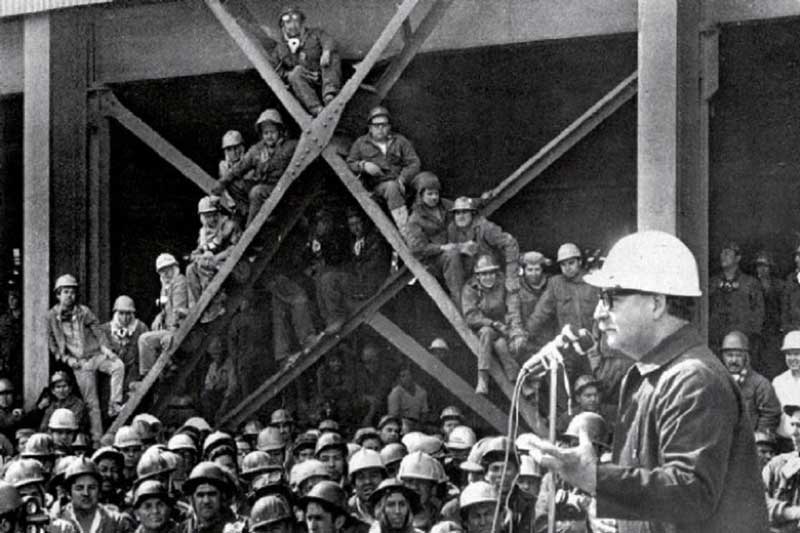
The nationalization of copper mines posed a major threat to the capital interests of foreign monopolies. With an annual production of 685,000 tons of copper, Chile was the second largest copper exporter in 1970. Copper accounted for 68% of Chile’s exports and brought in 80% of its foreign exchange. 20% of the world’s known copper deposits were in Chile. According to a calculation published in Neues Deutschland, U.S. corporations robbed Chile of four billion dollars in the 50 years to 1970. The nationalization policy increased Chile’s annual foreign exchange earnings by at least $125 million.19Neues Deutschland, July 13, 1971, p. 7. Also to be brought under state control were the country’s banking and financial sectors, foreign trade, central infrastructure companies, energy, communications, the textile industry, and more. Agrarian reform, which had already been initiated under the previous government of Eduardo Frei, was to be continued and deepened. All large estates over 80 hectares were to be expropriated. Comprehensive social policy measures were part of the program, such as minimum wages and inflation compensation, free health care, a state housing program, comprehensive support for education and much more. The government’s foreign policy orientation was a sharp challenge to U.S. imperialism:
“The position of active defence of Chile’s independence entails the condemnation of the existing “Organization of American States” (OAS) as an instrument and agency of North American imperialism and the struggle against any form of Pan-Americanism as understood by this organization. The People’s Government is committed to contributing to the creation of a body that truly represents the countries of Latin America.“20Government Program of the Unidad Popular 1969, quoted from: Anti-Imperialist Information Bulletin, No.11/12, 1973.
Every form of colonialism and neo-colonialism was condemned by the party alliance. At the same time, the UP declared solidarity with the struggles for liberation and for the establishment of socialism, especially with the Cuban Revolution.
After being sworn in, President Allende began to rapidly implement the program. Chile became an important driving force for the democratization of the prevailing economic and financial order, also as part of the Non-Aligned Movement.21The dossier “The coup against the third world: Chile, 1973” by Tricontinental: Institute for Social Research explores the role of the Popular Front government for the anti-imperialist forces of the time. In it, the authors conclude: “The coup against the Allende government was directed not only against its policy of nationalizing copper, but also against the fact that Allende had offered leadership and set an example to other developing countries seeking to implement the principles of a New World Economic Order.” See at: https://thetricontinental.org/dossier-68-the-coup-against-the-third-world-chile-1973/
The GDR government had already politically supported the land reform under the previous government and commended the UP’s measures. Companies and owners from the FRG, on the other hand, were severely affected by Chile’s new economic and socio-political measures. Chile was the most important supplier of copper to West Germany (35% of copper imports were imported from Chile). 20% of the expropriated land in Chile was taken from the hands of German nationals. Roughly 360 “German” estates were expropriated in the process.22Cf. Dufner, Georg: “Chile und die Bundesrepublik Deutschland im Kalten Krieg”. In: Dufner; Fermandois; Rinke (2022), p. 198. In addition to the German paint factory Ceresita (a subsidiary of Preussag) and the Rodenstock factories, 16 other companies with German capital were occupied or expropriated, partly on the spontaneous initiative of Chilean workers. For example, the management of the Hoechst subsidiary Fibro-Química Chilena Ltda. rejected the workers’ demand for an 800 percent wage increase, and they subsequently occupied the factory. 23Ibid., p. 200.
In addition, German business executives were annoyed by profit-diminishing social measures to increase wages and improve working conditions. To counteract nationalization, the German-Chilean Chamber of Commerce (CAMCHAL) recommended emergency measures, such as adjusting wages for inflation and forming their own unions.24Ibid., p. 201.
Economic and political cooperation between the GDR and Chile experienced a massive upswing. Salvador Allende had already visited the GDR in 1966 and maintained close contact with the GDR’s trade representation in Santiago.25Wentker, Hermann: “Außenpolitik in engen Grenzen”. R. Oldenbourg Verlag, Munich, 2007, p. 355. Fraternal relations were of course maintained between the SED and the Chilean Communist Party, which was part of the UP government. With the UP’s election victory, diplomatic recognition of the GDR was now on the table. Since the founding of both German states in 1949, the FRG had punished all states that maintained official relations with the GDR by imposing comprehensive sanctions on them. This massively limited the economic and political possibilities of socialist Germany. Although the FRG government under Brandt and Scheel (from 1969) gradually distanced itself from this so-called “Hallstein Doctrine”, the FRG’s claim to be the sole representative of Germany initially remained. The FRG also exerted pressure on the Allende government not to recognize the GDR. In fact, this delayed the official establishment of diplomatic relations until the spring of 1971. In the joint communiqué between Chile and the GDR on the establishment of diplomatic relations of April 6, 1971, the principles and goals of the sovereign equality of states, their mutual respect and non-interference in internal or external affairs, were emphasized — a stark contrast to the threat of then U.S. President Nixon quoted above.
On this basis, trade agreements and treaties on scientific and technological cooperation were concluded in July 1971, and political exchanges were deepened.
For the GDR, it was of particular importance that the Chilean government campaigned internationally against the isolation of the GDR and, for example, advocated its membership in the United Nations World Health Organization. For Chile, a key goal was to diversify its trade relations in the first place. The GDR was to expand its imports from Chile, including copper and semi-finished and finished copper products. The trade agreements also provided for supplies of installations and machinery for the development of the Chilean economy. Part of the agreement was the transfer of scientific and technical experience and cooperation with regard to production processes.26Neues Deutschland, June 13, 1971, p. 6. This involved the deployment of GDR experts in copper mining and the agricultural and food industries and the training of Chilean specialists in the GDR.27Dufner; Fermandois; Rinke (2022), p. 97. A joint committee for economic, technical, and scientific cooperation, established at the end of 1971, was to comprehensively coordinate cooperation between the GDR and Chile for mutual benefit.28Drechsler (1974), p. 31. A group of socialist countries had also agreed with Chile to build over 20 factories and industrial plants.29See Neues Deutschland, June 25, 1971, p. 7, referring to the Soviet Union, the GDR, the CSSR, Bulgaria, Poland, Hungary, Romania, and Yugoslavia. The diverse and long-term agreements were undermined by the increasing acts of sabotage and disruption of the Chilean economy, instigated by reactionary forces within and outside the country.
The government under Allende insisted on its measures to the disadvantage of foreign monopolies. In an interview on U.S. television, Allende said: Whoever wanted to invest in Chile would have to accept the fact that the country’s mineral resources and other riches belonged to the people. After all, the North Americans would not put up with foreigners becoming owners of the oil in Texas, for example. Chile, he said, has had bad experiences with U.S. private investment: “In the last twelve years, more than $250 million has been invested in Chile, and in return, values of more than $1.05 billion have been moved out of Chile.” 30Neues Deutschland, November 3, 1971, p. 7.
The former private copper mining companies in Chile tried to oppose expropriation by all means. The U.S. Kennecott Copper Corporation threatened worldwide buyers of Chilean copper:
“If they intend to buy copper that comes from Chile’s El Teniente mine, we will be forced to take action against them with all the means at our disposal.“31“Wie eine Zitrone,” Spiegel 03/1973, January 14, 1973. At: https://www.spiegel.de/wirtschaft/wie-eine-zitrone-a-9e00bd89-0002–0001-0000–000042713549
They carried out their threat, for example prohibiting the processing of Norddeutsche Affinerie in Hamburg by temporary injunction and confiscating the 3,000 tons of copper worth eleven million deutschmarks.
In addition to the intensive economic cooperation, the GDR population sent broadly supported solidarity shipments to Chile, especially after the supply situation became more difficult as a result of the massive disruption of the economy set in motion by reactionary forces. In the course of 1973, four freighters sailed from the GDR to Chile. Equipment for a complete polyclinic, medicines, vaccines, school supplies and technology for fire and flood fighting were shipped. Trucks and mopeds were also in the solidarity shipments. In total, the GDR delivered donations totalling 42 million Deutsche Mark (Valutamark).32Dufner; Fermandois; Rinke (2022), p. 293. The last three freighters arrived in Chilean ports at the end of August. The medicines, 8,000 tons of flour, canned food, and industrial goods on board did not reach the Chilean population. The fascist coup led by Augusto Pinochet prevented their distribution.33Reichardt, Achim: “Nie vergessen — Solidarität üben!”. Kai Homilius Verlag, Berlin, 2006, p. 85.
The coup, West Germany, and the GDR
Although Fidel Castro had encouraged the organization of an armed workers’ militia during his three-week visit to Chile in November 1971, the UP government did not take any concrete steps in this direction.34Dufner; Fermandois; Rinke (2022), p. 241. Meanwhile, the U.S. intelligence agency continued its instigations in collaboration with reactionary groups in Chile.
While the U.S. government denied Chile any further loans after the UP’s electoral victory, it doubled its loans to the Chilean military to $10 billion in 1972. Chilean forces thus continued to obtain military equipment from the U.S., Chilean warships continued to participate (along with U.S. units) in the annual “Unitas” naval maneuvers, and Chilean officers continued to attend military training events in the Panama Canal Zone as well as in the United States.35Drechsler (1974), p. 27.
“The CIA, in concert with the Brazilian military dictatorship, pushed the activities of reactionary, in part pro-fascist, forces to overthrow anti-imperialist-oriented governments and to suppress the growing influence of the labour movement on the political development of the countries of Latin America. This massive counterrevolutionary push led to the overthrow of the progressive military government in Bolivia in 1971, the reactionary coup d’état in Uruguay in 1973, and the overthrow of the Popular Unity government under President Allende and the establishment of a fascist military dictatorship in Chile in 1973.“36Authors’ collective headed by Rathmann, Lothar (1974), p. 1192.
From one day to the next, the lives of communists, socialists and democrats in Chile were threatened. The fascist military persecuted, tortured, and killed members and supporters of the UP government. Some of them tried to leave the country, with the Pinochet regime also trying to prevent them from leaving through embassies. Ten days after the coup, on September 21, 1973, the GDR broke off diplomatic relations with Chile. The embassy of the FRG reacted very hesitantly at first. In the first days after the coup, nearly 100 people requested asylum at the West German embassy but were referred to Latin American missions. As time went on, people were also allowed to leave the country through the West German embassy, although, in the spirit of a concession to the coup government, they were admitted only on a humanitarian basis and excluded those who had been politically persecuted.
“Once inside the embassy, the asylum seekers were questioned by officers of the Federal Office for the Protection of the Constitution: the possible entry of left-wing extremists was a topic of German debate. On December 8, 1973, the first group of emigrants arrived in Frankfurt.“37Dufner; Fermandois; Rinke (2022), p. 189.
Political and business representatives in the FRG reacted positively to the fascist coup:
“Invest in Chile now!” demanded the Frankfurter Allgemeine Zeitung on Friday, 21 September 1973. The Neue Westfälische Zeitung found: “Coup in Chile is positive for banks. Investments can be made again in South America.” Farbwerke Hoechst was “of the opinion that the actions of the military and the police could not have been planned and coordinated more intelligently.” It was, they said, an action that had been prepared down to the last detail and executed brilliantly. “The Allende government has met the end it deserved […]. Chile will be an increasingly interesting market for Hoechster products in the future.” Der Spiegel judged correctly on 8 October 1973: “The Chilean generals […] will not have to do without help from Bonn.“38Herz, Rudolf: “Ich war OibE ‘Kern’ in Chile”. Verlag am Park, Berlin, 2023. p. 22f.
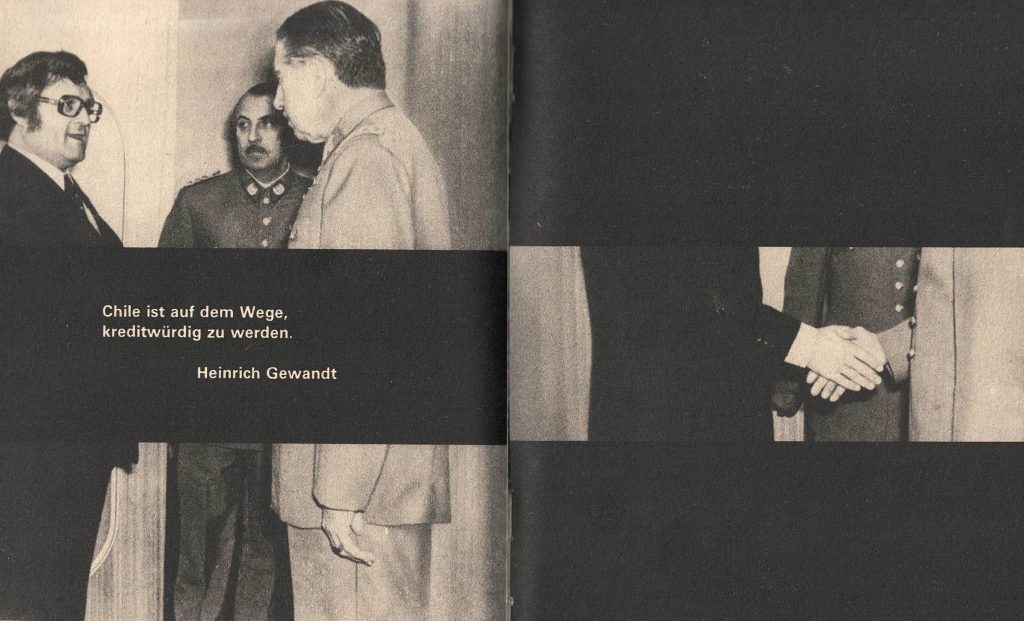
For the chairman of the CDU/CSU parliamentary group in the Bundestag, Karl Carstens, Allende’s death was a “tragic symbol” of the incompatibility of socialism and democracy. In October 1973, the head of the Konrad Adenauer Foundation39The Konrad Adenauer Foundation had long maintained a well-staffed office in Santiago with five full-time employees, which sought to influence political circles in Chile in the interests of the Federal Republic. (Cf. Dufner; Fermandois; Rinke (2022), p. 190). and CDU secretary general, Bruno Heck, expressed his hope that after the economic chaos under Allende that had led to the coup, improvement could now be expected.40Dufner; Fermandois; Rinke (2022), p. 114. The remarks of Franz Josef Strauß, then chairman of the CSU, are also well-known:
“Given the chaos that has reigned in Chile, the word order suddenly takes on a sweet sound again for Chileans.“41Quoted from: Sontheimer, Michael: “50 Jahre Sturz der Regierung Allende in Chile,” taz, 17.06.2023. At: https://taz.de/!5938516/
As an advisor to the military junta and significantly involved in the drafting of the Pinochet regime’s constitution, Prof. Dieter Blumenwitz, a scholar of international and constitutional law as well as a leading representative of “Eastern Studies” (Ostforschung), was a member of the Board of Trustees ‘Indivisible Germany’.42Grimmer, Reinhard; Irmler, Werner; Opitz, Willi; Schwanitz, Wolfgang: “Die Sicherheit. Zur Abwehrarbeit des MfS”. Volume 1, Berlin 2002, p. 244. German involvement in the torture and murder of the dictatorship, however, goes much deeper. After 1945, roughly 1,000 officers of the SS, SA, and Gestapo went to Chile.43Wilfried Huismann: “Pinochet’s German Godfather.” Tagesschau, 03.09.2023. At: https://www.tagesschau.de/investigativ/wdr/chile-pinochet-diktatur-nazis-rauff-100.html Some of them got new jobs in the Chilean secret service, the “Dirección de Inteligencia Nacional”, or DINA, established in 1973, where they were known as ‘our German troops’. The DINA’s main task was to destroy the ‘internal enemy’ and to eradicate communism throughout Latin America as part of Operation Condor. Walther Rauff was also involved in a leading function. During Hitler’s reign Rauff was, among other things, head of a task force in the North African campaign, and under Pinochet he is said to have explicitly helped to set up the DINA along the lines of the Gestapo. A publication by Wilfried Huismann comes to this conclusion:
“What has become increasingly clear during the research is that Walther Rauff, the developer of the gas van for the murder of Jews, was also the architect of the industrial extermination of opponents of the regime in Chile, together with Christoph Willeke and DINA head Manuel Contreras.“44Wilfried Huismann: “50 Years Ago: Putsch in Chile — Pinochet’s German Godfathers,” ARD, 2023. At: https://www.ardaudiothek.de/episode/dok-5-das-feature/vor-50-jahren-putsch-in-chile-pinochets-deutsche-paten/wdr‑5/94743246/
The research also followed leads to the FRG’s foreign intelligence service, the Bundesnachrichtendienst (BND), which counted Rauff as one of its employees until at least 1963.
“Rauff’s partner in the DINA leadership, Brigadier General Christoph Willeke, was responsible, among other things, for relations with the BND and travelled several times to join his colleagues in Pullach. There he received information about Chilean “extremists” living in exile in Germany. On his way back, according to Vergara’s recollection, he also personally brought laboratory equipment and ingredients of the poison gas sarin to Chile.“45Wilfried Huismann: “Pinochet’s German Godfather.” Tagesschau, 03.09.2023. At: https://www.tagesschau.de/investigativ/wdr/chile-pinochet-diktatur-nazis-rauff-100.html
The list of high-level support from West Germany and Germans in exile for the Chilean putschists could be extended, for example with the notorious “Colonia Dignidad”, which served among other things as a torture facility and DINA headquarters.46See also: Interview with Jan Stehle by Frederic Schnatterer: “State within the State and Key Actor in Repression,” jungeWelt supplement on the “Coup in Chile,” September 6, 2023. The solidarity with the UP, which was also widespread amongst the West German population, exerted pressure on politics and public debate. At least some SPD politicians publicly distanced themselves from the coup.
In the GDR, the coup triggered a broad wave of solidarity. Mass rallies were organized in Berlin and other large cities. Over the 15 years following the coup, roughly 5,000 Chileans found exile in the GDR. While the leadership of the Chilean Communist Party ended up in the Soviet Union, the GDR became the main host country for Chilean exiles in Eastern Europe, who had to find their way from Chile to the GDR in sometimes adventurous ways. The GDR achieved an effective success by smuggling out the General Secretary of the Socialist Party, Carlos Altamirano, in the trunk of a GDR intelligence agent’s car.

After their arrival in the GDR, Chileans were first housed in homes where they learned German, followed by their settlement in 12 major cities across East Germany, where they were given new-build apartments and also provided with an interest-free loan. Most of them went on to take up work to earn their own living, while others began vocational training or took up university studies. Chilean children attended GDR schools, with the subjects of Spanish, Latin American history, and geography were taught by Chilean educators. The costs were covered by the GDR’s Solidarity Committee. In Berlin, political Chilean exiles founded the “Chile Antifascista” office, a hub for the integration of Chileans and ongoing solidarity work for Chile. In addition, the foreign offices of the Unidad Popular and the Socialist Party of Chile operated from the GDR. 47Reichardt, Achim (2006), S. 86.
The friendly relationship between the GDR and the Chilean people also found a diverse cultural expression. Novels, films, and music by Chileans, covering the development of their country, but also their life in exile were published in the GDR. To mark the 50th anniversary of the fascist coup, the two documentaries “The War of the Mummies” (1974) and “El Golpe Blanco. The White Coup” (1975) deserve special mention. Both films by Heynowski and Scheumann48More information about the films from the DEFA Foundation at: https://www.defa-stiftung.de/filme/filme-suchen/der-krieg-der-mumien/ and https://www.defa-stiftung.de/filme/filme-suchen/el-golpe-blanco-der-weisse-putsch/ are based on footage taken before, during and after the coup in Chile.
A central lesson from the military coup in Chile was the need to counter the violence of the reactionary forces. The GDR also supported this front. In the years following the Pinochet dictatorship, 21 members of the Chilean Communist Party received military training in the GDR’s National People’s Army.49Storkmann, Klaus: “Geheime Solidarität”. Ch. Links Verlag, 2012, p. 367.
Continuities and legacies
With the military dictatorship, the so-called Chicago Boys, a group of economists who had studied the teachings of Milton Friedman and Friedrich August von Hayek at the University of Chicago, came to Chile. Together they imposed an unprecedented program of economic liberalization on the country. The state pension system was replaced by private pensions. Electricity and water supply were privatized alongside the education and health care systems. Workers’ rights were stripped away. On the basis of these policies, which also earned Chile the title of “laboratory of neoliberalism,” the Andean country developed into the OECD state with the greatest social inequality. One percent of the population controls one third of the wealth.50See Boddenberg, Sophie, “Chile: Revolt in the Laboratory of Neoliberalism.” December 2019. At: https://www.blaetter.de/ausgabe/2019/dezember/chile-aufstand-im-labor-des-neoliberalismus
Looking at German-Chilean economic relations, the continuity of the relationship, which has lasted over 150 years, is evident. The FRG Foreign Office writes:
“The EU is Chile’s third largest trading partner after China and the United States. Within the EU, Germany is Chile’s most important trading partner. Germany mainly purchases raw materials (copper) and foodstuffs from Chile. German exports to Chile traditionally focus on industrial products.“51Federal Foreign Office: “Germany and Chile: Bilateral Relations”. Feb. 24, 2023. At: https://www.auswaertiges-amt.de/de/service/laender/chile-node/bilateral/201114
Within the EU, Germany is Chile’s most important trading partner. A quarter of EU imports come from Germany. On the list of Chile’s most important import countries, Germany ranks 5th after China, USA, Brazil, and Argentina. In contrast to the 1970s, lithium is now mostly sought after by international monopolies. Chile has one of the world’s largest deposits of lithium, controlled and mined by the private companies SQM and Albermarle, which in turn have contracts with Tesla, LG Energy, and Mercedes-Benz, for example.52Manager Magazin: “Chile’s president wants to put lithium mining under state control”. Apr. 21, 2023. At: https://www.manager-magazin.de/unternehmen/energie/chile-praesident-gabriel-boric-will-lithium-abbau-verstaatlichen-a-107982aa-3658–4d6e-9339-d15977e7a2b0#:~:text=Chile%20has%20one%20of,the%20batteries%20used%20for%20electric%20cars.
A superficial judgment might conclude that the economic relations between the GDR or the FRG and Chile are quite similar after all. In both cases, copper was imported and industrial goods are exported. Yet such a conclusion overlooks the basic character of this exchange: Who owns the copper mines? Who appropriates the value earned within this sector? The reaction to the UP’s policy of nationalization was completely different in the FRG and the GDR. This necessarily results in a completely different relationship to the independence and development of the Chilean people. Only through the control of the most important sectors of the economy alongside the command over finances and investments had a gradual shift of the historically grown roles within the international division of labour become possible. The GDR supported this path, while the FRG – sometimes covertly, sometimes openly – did everything it could to end it.
At a time when dissent and revolt against a system and policy of imperialist subjugation and plunder are growing stronger, Chile’s UP government is a remarkable example of the difficulties and contradictions in the struggle for sovereignty and social progress. The fascist coup 50 years ago dispels all illusions in the democratic or peaceful character of imperialism and the leading financial oligarchy. When it comes to maintaining or expanding their interests and economically dominant role, all means are on the table.
Footnotes
- See, among others: Bergmann; Fugmann: “Did the German Secret Service BND Support Pinochet’s Coup?” at: https://www.mdr.de/nachrichten/deutschland/chile-putsch-bnd-colonia-dignidad-waffen-100.html Or also: FAKT: “German Secret Service Agents and Diplomats in Chile” at: https://www.ardmediathek.de/video/fakt/deutsche-geheimdienstler-und-diplomaten-in-chile-73/das-erste/Y3JpZDovL21kci5kZS9zZW5kdW5nLzI4MTA2MC8yMDIzMDkwNTIxNDUvZmFrdC1ibmQtZ2VnZW4tc3Rhc2ktMTAy
- See Bernedo, Patricio; Bilot, Pauline: “La inmigración alemana en Chile en el siglo XIX”. In: Dufner; Fermandois; Rinke: “Germany and Chile, 1850 to the present: a handbook”. Akademischer Verlag Stuttgart, 2022, p. 50.
- As of 2015, there were 27 German schools in Chile, the highest number of foreign schools in relation to the population.
- Sanhueza, Carlos: “Chile y Alemania 1871–1914: un vínculo que se solidifica”. In: Dufner; Fermandois; Rinke (2022), p. 57.
- Authors‘ collective headed by Rathmann, Lothar: “Grundfragen des antiimperialistischen Kampfes der Gegenwart Teil II”. Akademie-Verlag, Berlin, 1974, p. 1184.
- Ibid. p. 1182.
- Ibid. 1198.
- Industriekurier, 11.12.1969. Quoted from: Authors’ collective headed by Rathmann, Lothar (1974), p. 1219.
- WDR: “June 24, 1963 — The German Development Service (DED) is founded”. At: https://www1.wdr.de/stichtag/stichtag7594.html
- Quoted from: Authors’ collective headed by Rathmann, Lothar (1974), p. 1202.
- Cf. authors’ collective headed by Rathmann, Lothar (1974), p. 1203.
- Cf. authors’ collective headed by Rathmann, Lothar (1974), p. 1204.
- Süddeutsche Zeitung, 16.2.1972, quoted from: Lloyd, Jürgen: “Exportierter Faschismus.” JungeWelt, 20.07.2023.
- Quoted from Antiimperialist Information Bulletin (AIB) No. 11/12, 1972, pp. 38–41. At: https://www.mao-projekt.de/INT/LA/S/AIB_1973_Chile_Referat.shtml
- Quoted from Drechsler, Horst: “Die antiimperialistische Außenpolitik der Volkseinheitsregierung in Chile”. Africa, Asia, Latin America 1/1974, p. 25.
- Quoted from ibid., p. 26.
- The Unidad Popular initially consisted of the following six parties: Socialist Party of Chile, Communist Party of Chile, Social Democratic Party, Popular Unitary Action Movement (MAPU), Popular Independent Action and Radical Party.
- Government program of the Unidad Popular 1969. Quoted from: Anti-Imperialist Information Bulletin, No.11/12, 1973. At: https://www.mao-projekt.de/INT/LA/S/AIB_1973_Chile_Referat.shtml
- Neues Deutschland, July 13, 1971, p. 7.
- Government Program of the Unidad Popular 1969, quoted from: Anti-Imperialist Information Bulletin, No.11/12, 1973.
- The dossier “The coup against the third world: Chile, 1973” by Tricontinental: Institute for Social Research explores the role of the Popular Front government for the anti-imperialist forces of the time. In it, the authors conclude: “The coup against the Allende government was directed not only against its policy of nationalizing copper, but also against the fact that Allende had offered leadership and set an example to other developing countries seeking to implement the principles of a New World Economic Order.” See at: https:thetricontinental.org/dossier-68-the-coup-against-the-third-world-chile-1973/
- Cf. Dufner, Georg: “Chile und die Bundesrepublik Deutschland im Kalten Krieg”. In: Dufner; Fermandois; Rinke (2022), p. 198.
- Ibid., p. 200.
- Ibid., p. 201.
- Wentker, Hermann: “Außenpolitik in engen Grenzen”. R. Oldenbourg Verlag, Munich, 2007, p. 355.
- Neues Deutschland, June 13, 1971, p. 6.
- Dufner; Fermandois; Rinke (2022), p. 97.
- Drechsler (1974), p. 31.
- See Neues Deutschland, June 25, 1971, p. 7, referring to the Soviet Union, the GDR, the CSSR, Bulgaria, Poland, Hungary, Romania, and Yugoslavia.
- Neues Deutschland, November 3, 1971, p. 7.
- “Wie eine Zitrone,” Spiegel 03/1973, January 14, 1973. At: https://www.spiegel.de/wirtschaft/wie-eine-zitrone-a-9e00bd89-0002–0001-0000–000042713549
- Dufner; Fermandois; Rinke (2022), p. 293.
- Reichardt, Achim: “Nie vergessen — Solidarität üben!”. Kai Homilius Verlag, Berlin, 2006, p. 85.
- Dufner; Fermandois; Rinke (2022), p. 241.
- Drechsler (1974), p. 27.
- Authors’ collective headed by Rathmann, Lothar (1974), p. 1192.
- Dufner; Fermandois; Rinke (2022), p. 189.
- Herz, Rudolf: “Ich war OibE ‘Kern’ in Chile”. Verlag am Park, Berlin, 2023. p. 22f.
- The Konrad Adenauer Foundation had long maintained a well-staffed office in Santiago with five full-time employees, which sought to influence political circles in Chile in the interests of the Federal Republic. (Cf. Dufner; Fermandois; Rinke (2022), p. 190).
- Dufner; Fermandois; Rinke (2022), p. 114.
- Quoted from: Sontheimer, Michael: “50 Jahre Sturz der Regierung Allende in Chile,” taz, 17.06.2023. At: https://taz.de/!5938516/
- Grimmer, Reinhard; Irmler, Werner; Opitz, Willi; Schwanitz, Wolfgang: “Die Sicherheit. Zur Abwehrarbeit des MfS”. Volume 1, Berlin 2002, p. 244.
- Wilfried Huismann: “Pinochet’s German Godfather.” Tagesschau, 03.09.2023. At: https://www.tagesschau.de/investigativ/wdr/chile-pinochet-diktatur-nazis-rauff-100.html
- Wilfried Huismann: “50 Years Ago: Putsch in Chile — Pinochet’s German Godfathers,” ARD, 2023. At: https://www.ardaudiothek.de/episode/dok-5-das-feature/vor-50-jahren-putsch-in-chile-pinochets-deutsche-paten/wdr‑5/94743246/
- Wilfried Huismann: “Pinochet’s German Godfather.” Tagesschau, 03.09.2023. At: https://www.tagesschau.de/investigativ/wdr/chile-pinochet-diktatur-nazis-rauff-100.html
- See also: Interview with Jan Stehle by Frederic Schnatterer: “State within the State and Key Actor in Repression,” jungeWelt supplement on the “Coup in Chile,” September 6, 2023.
- Reichardt, Achim (2006), p. 86.
- More information about the films from the DEFA Foundation at: https://www.defa-stiftung.de/filme/filme-suchen/der-krieg-der-mumien/ and https://www.defa-stiftung.de/filme/filme-suchen/el-golpe-blanco-der-weisse-putsch/
- Storkmann, Klaus: “Geheime Solidarität”. Ch. Links Verlag, 2012, p. 367.
- See Boddenberg, Sophie, “Chile: Revolt in the Laboratory of Neoliberalism.” December 2019. At: https://www.blaetter.de/ausgabe/2019/dezember/chile-aufstand-im-labor-des-neoliberalismus
- Federal Foreign Office: “Germany and Chile: Bilateral Relations”. Feb. 24, 2023. At: https://www.auswaertiges-amt.de/de/service/laender/chile-node/bilateral/201114
- Manager Magazin: “Chile’s president wants to put lithium mining under state control”. Apr. 21, 2023. At: https://www.manager-magazin.de/unternehmen/energie/chile-praesident-gabriel-boric-will-lithium-abbau-verstaatlichen-a-107982aa-3658–4d6e-9339-d15977e7a2b0#:~:text=Chile%20has%20one%20of,the%20batteries%20used%20for%20electric%20cars.
